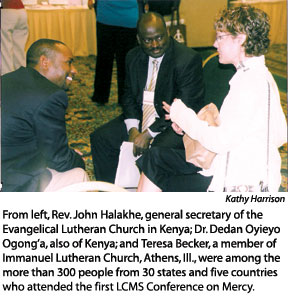By Kim Krull
Raised in a German Lutheran home and church, Karolyn Martinez says the typical view of mercy was to send money t
“There are countless ways we can show mercy: feed and clothe the needy, medical (ministries), just sharing Christ with them, just being an example for children,” said Martinez, a nurse and member of Trinity Evangelical Lutheran Church, Monroe, La.
“When people look, we want them to say, ‘What do you have that I don’t, and how do I get that?’” she said, referring to Christians’ acts of mercy in response to Christ’s love.
Martinez was one of more than 300 people from 30 states and five countries who gathered April 30-May 2 for the first-time LCMS Conference on Mercy in St. Louis. LCMS World Relief/Human Care presented the event to engage, equip, and energize.
“We are here to care for one another and to build up the body in Christ, to spread His mercy to many more who need it,” said LCMS World Relief/Human Care Executive Director Matthew Harrison. “It’s not about talking; it’s about doing the work of mercy — diakonia — filled with the spirit of God through His Word.”
Tim Goeglein, special assistant to President George W. Bush and deputy director of the White House Office of Public Liaison, told participants “there is no time in American history when we need a conference on mercy more than we do now.”
“What you ministers of mercy are doing every day is the most important thing in our country,” said Goeglein, an LCMS member, in his May 1 address. “No matter how much money we spend in government, the government can never love a person back.”
The Synod’s mercy arm brought Lutherans looking for ministry ideas together with experts loaded with experience and resources. Workshop leaders highlighted the church’s age-old theological basis for mercy. They shared the latest tools and partnership opportunities for ministries that involve housing and community revitalization, parish nursing, the deaconess ministry, Christian citizenship, and more.
Participants included young deaconess studies students, veteran pastors, and congregants with a variety of interests and passions.
Jerome Pelz, director of the Northeast Community Foundation and a member of St. John Lutheran Church, Decatur, Ill., said he most appreciated Dr. Kurt Senske’s session exploring the need for executives to stick to their Christian values in their workplace roles. Senske is CEO of Lutheran Social Services of the South and chairman of the board of LCMS World Relief/Human Care.
The conference also re-affirmed what Pelz said he has long believed. “We are our brother’s keeper 24/7 — not just on Sunday morning,” he said.
Rev. John Deang, assistant pastor at Christ Lutheran Church, Lincoln, Neb., said he learned more about how a congregation can identify and respond to needs outside the church door.
“Rev. Hernandez gave good information that shows the potential of a church to meet the needs of a local community — meeting needs like those for education, transportation and for families,” said Deang, who also serves as a Nebraska District missionary-at-large to African immigrants. He took part in an urban ministry workshop led by Rev. Carlos Hernandez, director of Districts and Congregations for LCMS World Relief/Human Care.
College and seminary students attended the conference with an eye toward future careers. “I got to meet people, make connections, and learn about diaconal service at places beyond Valpo,” said Linda Davis, a deaconess studies student at Valparaiso University in Indiana.
Also drawing attention was a mobile medical clinic that will be shipped to Sudan to serve as a doctor’s office to treat returning refugees. The $35,000, 40-foot, self-contained unit was purchased and refurbished by LCMS World Relief/Human Care and Orphan Grain Train with support from the Luth-eran Church of Webster Gardens in St. Louis. It will be filled with medical supplies before it departs for Africa later this year.
A conference highlight was spotlighting seven LCMS World Relief/Human Care partners for outstanding and faithful service that has touched lives from the hurricane-ravaged Gulf Coast to Africa. Harrison presented LCMS World Relief/Human Care’s inaugural Common Chest awards to:
- Andriamanisa Razoanivelo Domoina, a social worker in Madagascar who coordinates an HIV/AIDS education and prevention program in conjunction with the Malagasy Lutheran Church in Africa. She used a $25,187 grant from LCMS World Relief/Human Care to educate 480,000 people with life-saving information.
- Rasamimanana Sahalanirina Harison, Domoina’s husband and the administrator and surgeon at the Andranomadio Lutheran Hospital in Antsirabe, Madagascar. Unlike government-run institutions, the hospital operated by the Malagasy Lutheran Church treats patients too poor to pay for treatment.
- Rev. David Chuchu, director of Diakonia Compassionate Ministry for the Evangelical Lutheran Church in Kenya (ELCK), who coordinates a variety of human care projects, including care for orphans and street children and the construction of a medical clinic in the Kibera slum.
- Rev. Ray Wilke and Clayton Andrews, co-founders of Orphan Grain Train, the Norfolk, Neb.-based ministry that collects and ships donated supplies to people in need worldwide. Wilke is an LCMS pastor; Andrews is president of Andrews Van Lines.
- Rev. Kurtis Schultz, president of the LCMS Southern District, who was honored for his outstanding personal service and also on behalf of all Synod pastors and members who responded — and who continue to respond — to help rebuild lives devastated by Hurricane Katrina.
- Keith Frndak, president and CEO of Concordia Lutheran Ministries, Cabot, Pa. This growing social ministry organization provides care and services for older adults but also is strongly committed to outreach. Despite a devastating fire last year, the agency continued support for an inner-city soup kitchen and care for African orphans. Through innovative programs, the ministry provides hundreds of thousands of dollars for charitable work locally and internationally.
The Common Chest awards will be presented annually. They were inspired by Martin Luther, who wrote that a
